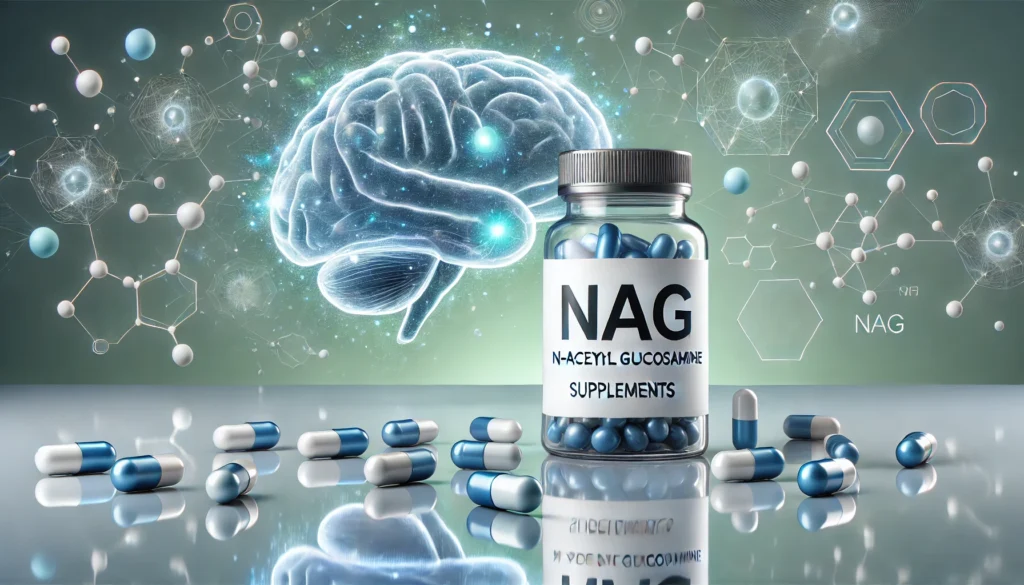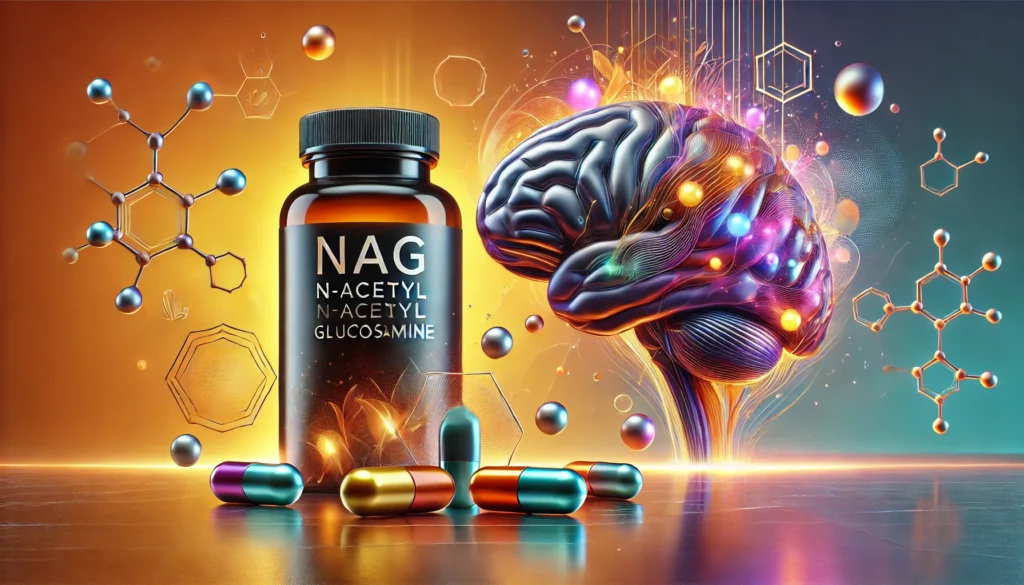N-Acetyl Glucosamine (NAG) is a derivative of glucosamine, a naturally occurring compound that plays an essential role in maintaining the health of joints, cartilage, and connective tissues. Glucosamine is often used as a supplement for joint health, and NAG, a more bioavailable form, is gaining attention for its potential nootropic benefits. NAG’s ability to reduce inflammation, support the gut-brain axis, and aid in glycosaminoglycan synthesis has led researchers to explore its possible effects on cognitive function and neurological health. This article provides an in-depth look at N-Acetyl Glucosamine, including its source, chemistry, physiological mechanisms, potential nootropic benefits, recommended dosages, side effects, and possible interactions with other substances.
You May Also Like:
Sources of N-Acetyl Glucosamine
N-Acetyl Glucosamine is derived from chitin, a polysaccharide found in the exoskeletons of crustaceans such as shrimp, crabs, and lobsters. The process of extracting NAG from chitin involves chemical or enzymatic hydrolysis, which breaks down the chitin into glucosamine and then further modifies it by attaching an acetyl group to the nitrogen atom of the glucosamine molecule. This modification enhances its stability and bioavailability, making it more effective for use as a supplement.
In addition to its extraction from animal sources, NAG is synthesized in laboratories, offering a vegan-friendly version for those with shellfish allergies or dietary restrictions. The synthetic form is chemically identical to the naturally sourced version and is typically used for NAG supplements marketed as vegan.
N-Acetyl Glucosamine is available in various forms, including capsules, tablets, and powders. It is commonly combined with other joint health supplements, such as chondroitin or MSM (methylsulfonylmethane), but can also be found in its pure form for cognitive health purposes.

Chemistry of N-Acetyl Glucosamine
N-Acetyl Glucosamine is a derivative of glucosamine, an amino sugar that is a precursor to important structural components in the body, such as glycosaminoglycans (GAGs) and proteoglycans. The primary difference between glucosamine and NAG lies in the acetyl group attached to the nitrogen atom of the glucosamine molecule. The acetyl group enhances the solubility, stability, and bioavailability of NAG, which makes it more effective at crossing cell membranes and interacting with key molecules within the body.
The chemical formula of N-Acetyl Glucosamine is C8H15NO6, and it exists as a white crystalline powder. In its natural state, glucosamine serves as a critical building block for joint cartilage and the extracellular matrix of tissues. NAG’s bioavailability is crucial in its use for supporting joint health and possibly for nootropic effects, as it can be absorbed more efficiently by the body than standard glucosamine.
Physiological Mechanisms of N-Acetyl Glucosamine in the Body and Brain
N-Acetyl Glucosamine plays several roles in the body that can potentially support both physical and cognitive health. Its mechanisms of action are multifaceted, making it a supplement of interest for a variety of health benefits, particularly in terms of inflammation reduction, cartilage health, and neuroprotection.
1. Joint Health and Cartilage Support
One of the primary applications of N-Acetyl Glucosamine is in promoting joint health. NAG is a critical component in the production of glycosaminoglycans (GAGs), which are essential building blocks for cartilage and other connective tissues. It helps stimulate the synthesis of proteoglycans and hyaluronic acid, which form the lubricating matrix of cartilage and synovial fluid, promoting flexibility and reducing friction between bones. By improving the structural integrity of cartilage, NAG may help alleviate the symptoms of osteoarthritis and other degenerative joint conditions.
In clinical studies, NAG has demonstrated its ability to reduce pain and improve joint function in individuals with osteoarthritis. The supplement has been shown to have comparable efficacy to glucosamine sulfate but with greater bioavailability, which may make it a more effective choice for individuals seeking joint support.
2. Anti-Inflammatory Properties
Inflammation plays a key role in many chronic diseases, including neurodegenerative conditions like Alzheimer’s disease and Parkinson’s disease. Chronic inflammation in the brain can lead to cognitive decline and is thought to contribute to the pathogenesis of neurodegenerative diseases. N-Acetyl Glucosamine has been studied for its anti-inflammatory effects, as it helps modulate the immune response and suppresses the production of pro-inflammatory cytokines like tumor necrosis factor-alpha (TNF-α) and interleukin-1 beta (IL-1β). By inhibiting the production of these inflammatory molecules, NAG may help protect the brain from inflammation-related damage.
The anti-inflammatory effects of NAG extend beyond the brain and may benefit the entire body. Inflammatory cytokines play a role in various conditions, including arthritis, cardiovascular disease, and autoimmune disorders. By reducing inflammation in the joints and tissues, NAG may improve overall health and help manage symptoms associated with these conditions.
3. Gut-Brain Axis and Cognitive Function
An intriguing area of research is the connection between gut health and cognitive function, known as the gut-brain axis. N-Acetyl Glucosamine plays a role in maintaining the integrity of the intestinal barrier, which prevents harmful substances from entering the bloodstream and affecting systemic inflammation. When the gut lining is compromised, it can lead to “leaky gut syndrome,” a condition in which toxins and bacteria leak into the bloodstream, triggering widespread inflammation that can affect brain function.
NAG’s ability to support the mucosal lining of the gut may help prevent these issues, indirectly benefiting brain health by reducing systemic inflammation. Additionally, a healthy gut microbiome is linked to improved mood regulation, cognition, and overall brain health. Therefore, by promoting gut health, NAG may help enhance cognitive function and mental clarity.
4. Glycoprotein Synthesis and Neuroprotection
Glycoproteins are essential for cell communication, adhesion, and signaling in the body, including within the nervous system. N-Acetyl Glucosamine is a building block for glycoproteins and plays a role in maintaining the structural integrity of the extracellular matrix of neurons. This contributes to synaptic plasticity, a process that is vital for learning, memory, and overall cognitive function. By supporting the synthesis of glycoproteins, NAG may aid in the repair and maintenance of neurons, thereby promoting neuroprotection and cognitive health.

Nootropic Benefits of N-Acetyl Glucosamine
While N-Acetyl Glucosamine is best known for its joint health benefits, research suggests that it may also offer subtle cognitive benefits. Although NAG is not typically considered a primary nootropic like caffeine or racetams, its potential neuroprotective effects make it an interesting option for cognitive support. The nootropic benefits of NAG can be categorized into several key areas:
1. Neuroprotection from Inflammation
Chronic inflammation is a known contributor to neurodegenerative diseases such as Alzheimer’s disease and Parkinson’s disease. By reducing the levels of inflammatory cytokines in the body and brain, NAG may help protect neurons from inflammatory damage. Inflammation can interfere with neurotransmitter signaling, impair synaptic plasticity, and ultimately lead to cognitive decline. NAG’s anti-inflammatory effects may help maintain brain function and delay the onset of age-related cognitive decline.
2. Cognitive Clarity via Gut Health
As mentioned earlier, N-Acetyl Glucosamine’s role in maintaining gut integrity can also have a positive effect on cognitive function. A healthy gut microbiome is crucial for proper brain function, as it influences the production of neurotransmitters and regulates inflammation. By supporting gut health, NAG may indirectly improve mental clarity, focus, and memory, which are all important aspects of cognitive function.
3. Enhanced Memory and Learning
N-Acetyl Glucosamine’s contribution to glycoprotein synthesis plays a role in the health of neurons and synapses, which are essential for memory formation and learning. Synaptic plasticity—the ability of synapses to strengthen or weaken over time in response to activity—is a critical process for memory and learning. By supporting the structural components necessary for synaptic plasticity, NAG may enhance the brain’s ability to learn and retain information, making it a valuable supplement for those looking to improve their cognitive performance.

Dosage and Supplementation Guidelines
The typical dosage of N-Acetyl Glucosamine for general health is between 500 to 1,500 mg per day, often divided into two or three doses throughout the day. Higher doses may be required for joint health purposes, but for cognitive support, the recommended dosage remains similar to that used for general health.
Dosage for Joint Health:
For those using NAG to support joint health, the standard dose ranges from 1,500 mg to 3,000 mg per day, depending on the severity of joint pain or inflammation. This is typically taken in divided doses throughout the day to improve absorption and minimize side effects.
Dosage for Cognitive Support:
For cognitive support, a lower dose of 500 to 1,000 mg per day is recommended. Some individuals may find benefits from taking this amount, particularly in terms of improved mental clarity and reduced brain fog.
Side Effects and Safety Considerations
N-Acetyl Glucosamine is generally well-tolerated by most individuals when taken at the recommended doses. However, some people may experience mild side effects, particularly if they take higher-than-recommended doses or if they have sensitivities to shellfish.
Potential Side Effects:
- Gastrointestinal Distress: Some individuals may experience bloating, gas, or stomach discomfort when taking NAG supplements.
- Allergic Reactions: Because NAG is often derived from shellfish, individuals with shellfish allergies should avoid this supplement or opt for vegan alternatives.
- Headache: This is a rare side effect, but some individuals may experience headaches when starting NAG supplementation.
Safety Considerations:
Before starting N-Acetyl Glucosamine supplementation, it is recommended to consult with a healthcare provider, particularly for those with underlying health conditions or who are pregnant or breastfeeding. NAG has not been studied extensively in these populations, so it’s essential to exercise caution.

Interactions with Other Supplements and Medications
N-Acetyl Glucosamine is relatively safe and has few reported interactions with other supplements or medications. However, it is always wise to check with a healthcare provider before combining NAG with other substances.
- Blood Thinners: As NAG can have mild anticoagulant effects, individuals taking blood-thinning medications (such as warfarin) should exercise caution and consult a healthcare provider before using NAG.
- Other Joint Health Supplements: NAG is often combined with glucosamine, chondroitin, or MSM. These supplements generally work well together and can provide enhanced joint support.
Is N-Acetyl Glucosamine a Viable Nootropic Supplement?
N-Acetyl Glucosamine is a versatile supplement with a broad range of potential benefits, particularly for joint health, inflammation reduction, and cognitive support. While more research is needed to fully understand its nootropic effects, its ability to protect against neuroinflammation, support the gut-brain axis, and promote overall brain health offers promising possibilities for enhancing cognitive function. Its safety profile, combined with its effectiveness in supporting joint and cartilage health, makes it a valuable supplement for those seeking a holistic approach to wellness.
Additionally, as a highly bioavailable form of glucosamine, NAG presents a superior option for individuals seeking to improve both their physical and mental well-being. However, like any supplement, it is essential to use it responsibly and consult with a healthcare provider to ensure it aligns with individual health needs and goals. Ultimately, N-Acetyl Glucosamine is a supplement that could play an important role in the future of cognitive health and joint care, especially as further studies continue to reveal its full potential.

References:
- Glucosamine – Uses, Side Effects, and More. Retrieved from: https://www.webmd.com/vitamins/ai/ingredientmono-807/glucosamine
- Oral N-Acetylglucosamine Treatment Benefits Management of MS, Study Finds. Retrieved from: https://www.ajmc.com/view/oral-n-acetylglucosamine-treatment-benefits-management-of-ms-study-finds
- Does Glucosamine Work? Benefits, Dosage, and Side Effects. Retrieved from: https://www.healthline.com/nutrition/glucosamine
Important Note: The information contained in this article is for general informational purposes only, and should not be construed as health or medical advice, nor is it intended to diagnose, prevent, treat, or cure any disease or health condition. Before embarking on any diet, fitness regimen, or program of nutritional supplementation, it is advisable to consult your healthcare professional in order to determine its safety and probable efficacy in terms of your individual state of health.
Regarding Nutritional Supplements Or Other Non-Prescription Health Products: If any nutritional supplements or other non-prescription health products are mentioned in the foregoing article, any claims or statements made about them have not been evaluated by the U.S. Food and Drug Administration, and such nutritional supplements or other health products are not intended to diagnose, treat, cure, or prevent any disease.


